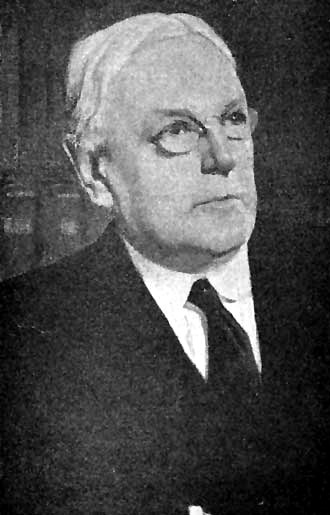| Profile | Major Works | Resources |
Oliver Mitchell Wentworth Sprague, 1873-1953.


Moneary and business cycle theorist at Harvard
Oliver Mitchell Wentworth Sprague was a Massachusetts native. Sprague received his Ph.D. from Harvard in 1897, under Charles Dunbar In 1900, O.M.W. Sprague was appointed to the economics faculty at Harvard, to take up some of the work with the departure of the major figures of the department. He quickly became T.N. Carver's right-hand man. Sprague had a stint at the University of Tokyo between 1905 and 1908. After returning to the United States in 1908, Sprague joined the faculty of the newly-founded Harvard Business School. Sprague was thus a almost constantly at Harvard, from his beginnings until his retirement in 1941.
O.M.W. Sprague made a name for himself as an expert on money and banking, writing an authoritative and highly influential 1910 book on the financial crises of 1873, 1883, 1893 and 1997, which helped pave the way for the establishment of the Federal Reserve System in 1913..
In the 1930s, Sprague was an frequent economic advisor, both for the US as well as foreign governments. Sprague was an advisor to the Bank of England from 1930 to 1933 and the US Treasury in 1933. A strong supporter of the Gold Standard, Sprague split with Frank Delano Roosevelt in 1933 over the departure from gold.
Among his more interesting contributions, Sprague tried to draw attention to the concept of "financial fragility" that was later taken up by Hyman Minsky. In effect, Sprague argued that booms encourage the accumulation of debt, thereby making the economy quite vulnerable to small fluctuations in prices and interest rates that it might otherwise be able to absorb. In his testimonies to Congress in the 1930s, Sprague pointed out that the wave of bank failures that precipitated the Great Depression was largely caused by the devastating impact of the fall in commodity prices on over-accumulated farm debt (taken out on highly-appreciated farm equipment during the boom years).
Although his earlier works had emphasized the importance of monetary factors in intensifying recessions, he did not regard them as causes by themselves. Sprague did not believe the Great Depression could be recovered by monetary policy alone, that there were more problematic underlying structural problems. Sprague went on to denounce other FDR policies of the New Deal, and argued strenuously that price and wage deflation were key.
|
Major Works of O.M.W. Sprague
|
|
HET
|
|
Resources on O.M.W. Sprague
|
All rights reserved, Gonšalo L. Fonseca
